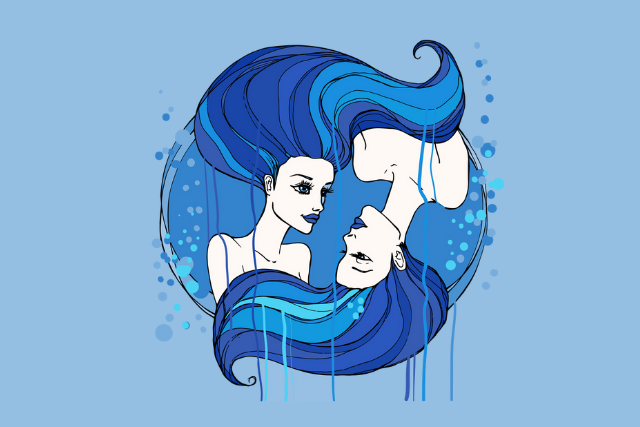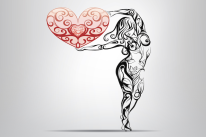
“Have the courage to follow your heart and intuition. They somehow already know what you truly want to become.” ~Steve Jobs
I was a sensitive child growing up, and I felt everything deeply. Unfortunately, my childhood home was dominated by chronic tension, fear, and anger—not an ideal environment for anyone, let alone a perceptive and empathic child.
My father was rather authoritative and controlling, and he disciplined us harshly. I was raised to obey without questioning and punished for mistakes or not falling in line.
Love was only assumed but never shared, and so I grew up feeling alone, unsupported, and like I was never enough. Craving my parents’ love and attention, I became the good girl, the overachiever, the people pleaser, the caretaker—the chameleon who knew how to morph herself to fit the environment in order to feel accepted. Over the years, I lost a sense of who I was, never really feeling like I belonged.
Instead, I felt like I had no voice. My feelings were chronically dismissed or invalidated—there was no room for what I wanted, felt, or needed.
I grew up thinking others knew what was good for me better than I did myself. I grew up seeking their approval, attention, and affection. I grew up disconnected from my own feelings and instead hyper-attuned to what others needed from me. Disconnected from my emotions and judgments, I second-guessed myself, never quite trusting my instincts about what was healthy and what was not.
Loyal to a fault, I tolerated toxic relationships, unable to leave people who gave me just enough attention to keep me around but not enough for me to feel fulfilled. I ended up chasing people who were unavailable, invalidating, and unsupportive; love entangled with pain was all I knew.
I became a caretaker who forgot she has needs too. I compromised my values, kept giving chances to people who’d take me for granted, eventually erecting walls to protect myself from the world that just didn’t get me, didn’t value me—a world that didn’t care.
Isolated, lost, and depressed, I finally realized that the hurt inside me was hurting the people I love the most—my own children. I didn’t want to pass my trauma and my parents’ trauma down to the next generation, so I made a promise to myself to heal as best I could.
This was the first step on my journey back to myself. It took me years, but I eventually came home.
Trauma Leaves an Imprint on the Body, Mind, Heart, and Soul
Adverse experiences in childhood leave a mark on a developing brain, personality, and a sense of self, especially if we did not receive adequate support and nurturing through the crisis. Worse yet if the trauma was chronic.
The reality is that trauma during childhood affects us to the core and rattles our sense of self. Not receiving the love, care, support and validation we need at our most vulnerable time leaves us feeling less than, undeserving, abandoned, and broken.
We often grow up internalizing fear, anger, guilt, shame, helplessness and a feeling of being unsafe in the world. Overwhelmed, we push the pain away and put on masks in order to survive. This isolates us and disconnects us from ourselves and the world around us, keeping us small, scared, and unfulfilled.
Growing up in an unstable or abusive home means we often become hypersensitive to stress, emotionally reactive, and unable to assert ourselves or go after what we want in life. We’re ridden with self-doubt, anxiety, and chronic overwhelm.
We lose our sense of agency and safety. We stop trusting our own judgment and trusting in the flow of life.
We become overly controlling, perfecting, pleasing, and performing. Desperately trying to mask our shame and the feeling like we don’t belong, we become a warped version of ourselves, stuck in a cycle of fight-and-flight, push and pull, constantly negotiating between states of avoiding and reacting.
This affects us on physical, mental, emotional, and energetic levels. We get cut off from our intuition, our authenticity, and our higher self. We lose sight of who we are and what makes us happy.
Childhood Trauma Destroys Trust
When those who are supposed to love and protect us harm or neglect us instead, trust is broken. When our caregivers don’t reflect our worth back to us, we never learn to internalize it. We grow up believing that we don’t deserve love, care, and attention.
If our feelings and emotions are not validated growing up, we begin to believe that they are invalid, that we shouldn’t feel them, that they are wrong. We begin to doubt ourselves and how we feel. Our sense of trust in our own experience is shaken.
Instead of listening to our inner voice, we let the outside world dictate how to live, feel, and behave. We lose a sense of who we are, what we want, and how we feel. This disconnect from our innermost self means that we end up living a life that isn’t really ours—it’s perhaps a successful life by modern standards, but not an authentic and fulfilling life.
This was my experience—until I learned to tune into my intuition.
Your Intuition is Your Superpower
Our intuition is the bridge connecting our body, mind, and soul. This is not the loud voice of our ego, but the quiet yet steady one underneath our judgments, assumptions, and interpretations.
Just as our body communicates through our senses, our spirit speaks to us through insights, hunches, dreams, and gut feelings—our intuition. Listening to that inner wisdom and allowing it to guide us toward what is best for us in the moment—and then following that intuitive knowing—opens the doorways for higher knowledge to enter our consciousness.
Aligning with the higher self this way doesn’t remove challenges and difficulties from our lives, but it fortifies our strength and courage and helps us find a path toward fulfillment.
Rebuilding Self-Trust
Trust is the foundation of any relationship, and that includes the one we have with ourselves. Without being able to trust ourselves, we’re unable to make decisions, we lack confidence, and we feel like we have no control over our own lives. Instead, we are plagued with confusion, fear, and self-doubt.
Fortunately, self-trust can be nurtured and strengthened. Here’s what helped me learn to trust my emotions, intuition, and judgment after the trauma of being dismissed and invalidated as a kid.
Spend time alone and reconnect with yourself.
Carve out some time in the day to just be and enjoy yourself—without any distractions. This may mean sitting in silence in your garden, meditating, or just listening to nature. Maybe you best connect with yourself on long walks. Or maybe you best hear yourself by writing your thoughts out—journaling about what matters to you, the lessons you learned from the past, or dreams you have for the future.
Whatever you choose, daily alone time will help you reset and renew, reconnect with who you are, and realign you with your true nature. The goal is to silence your mind and create space so that insight can come into your awareness.
Practice mindfulness.
Slow down and check in with yourself throughout the day. Sense into your body. How does it feel right now? What sensations are you noticing? What emotions are coming up? What wants to be heard? Fully tune into your inner experience in the moment. Consciously observe what is happening internally and take in any messages that you are receiving.
For example, you may find that you need to put up a boundary with a friend or a loved one. Perhaps you need to say no to an expectation in order to protect your mental health. Maybe you need to speak your truth or let something go if it no longer serves you. Follow these internal cues—they are your guides to what you want and don’t want in your life.
By tuning in and listening to your inner voice, you stay true to yourself. Instead of reacting habitually out of fear—saying yes out of a sense of obligation, staying quiet in order to keep the peace, or choosing others over yourself—you learn to respond from your inner wisdom and become more aligned with your wants and needs. You learn to have your own back.
Process stuck energies.
Take the time to feel any pain and trauma you’re still holding onto instead of repressing your feelings and distracting yourself with work, mindless scrolling, or substances. Gently and lovingly, acknowledge what happened and allow the hurt to come up, whether through physical sensations, feelings, or thoughts.
Sit with the discomfort watching it ebb and flow through your body. Observe it, embrace it, and surround it with kindness. Extend compassion to yourself for going through that experience alone. Give yourself the love and nurturing you needed but never received. Finally, consciously release it as if it’s just a cloud in the sky passing through, imagining feeling lighter and lighter.
Allowing the stuck energies to move through your physical body dissolves their power so that you’re no longer controlled by your past conditioning, painful experiences, and knee-jerk reactions. The trick is learning to surrender and allow the process to complete, one breath at a time.
The more painful the experience, the more time it takes to heal it. Be patient with yourself. You may have to sit with your pain again and again, but each time you will get closer to releasing its grip and finding peace.
Put yourself first.
This isn’t selfish—it’s taking ownership. And it’s empowering. Nurture your body, mind, and heart, prioritizing your own needs before you give to anyone else.
Create boundaries to protect your energy. Love yourself enough to keep commitments to yourself, your healing journey, and your growth—by showing up to do the work no matter how hard it gets.
Have your own back and stand up for yourself. Encourage yourself through hard times and celebrate your successes. Practice kindness, not perfection. Become your best friend and your loudest supporter. Be authentically you!
When I started putting myself first, my whole energy shifted. Instead of looking to others for validation and approval, I reached within. Instead of waiting for them to fulfill me, I started giving myself the love, care, and attention I craved. By focusing on meeting my own needs first, I was able to give to others from a place of love instead of obligation.
I used to feel anxious, burnt out, resentful, and taken for granted. Now I was showing others how I wanted to be treated.
By prioritizing myself, I was sending a message that my needs are just as important, and I deserve love and care too. The more I showed up for myself, the more I trusted that I was worth showing up for. As I drew boundaries, released the need to hold onto toxic or one-sided relationships, and started building the life I wanted to have, I found inner peace. I found my worth. I came home to myself.
—
Reclaiming your sense of self and the ability to trust your feelings and intuition is not only paramount to healing but also creating a fulfilling life.
By reconnecting with myself, practicing mindfulness, processing stuck energies, and putting myself first, I’ve learned to access and trust my intuition about what I need and what’s best for me. I reclaimed my worth and rebuilt a strong sense of self. As a result, I no longer attract or accept toxic relationships or situations. I trust that I deserve better—and I know you do too.
About Joanna Ciolek
Joanna Ciolek is a self-taught artist, recovering self-critic, and the author of mindfulness-based prompt journals, The Art of Homecoming and The Art of Untangling. To learn mindfulness, reconnect with yourself, and begin your healing journey, join her Free Course at The Mindfulness Journal. Follow Joanna on Twitter, Instagram, and Facebook.
- Web |
- More Posts













 Though I run this site, it is not mine. It's ours. It's not about me. It's about us. Your stories and your wisdom are just as meaningful as mine.
Though I run this site, it is not mine. It's ours. It's not about me. It's about us. Your stories and your wisdom are just as meaningful as mine. 